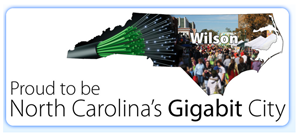Wilson has made their community-owned Greenlight fiber network central to their economic development plan, a move that may forge a new approach for other communities with similar assets.
Revitalization Efforts
In 2008, when Wilson’s Greenlight community network first launched, the Federal Communications Commission ranked North Carolina last in the nation in percentage of households subscribing to at least a “basic broadband” service. Today Wilson offers free Wi-Fi downtown, schools and libraries are outfitted with high-quality connectivity, and a majority of households subscribe to the broadband service.
Home to over 50,000 residents, Wilson has had a diverse history of industries popping up and dissipating over the years. After deploying their Greenlight Community Broadband, they’ve leveraged new businesses and an entrepreneurial spirit that shows no sign of relenting.
 Wilson is initially focusing development downtown. The local daily paper The Wilson Daily Times decided to refurbish an old building and move downtown. The city raised money to renovate an old theater into a cultural center, and an electrical components manufacturing company, Peak Demand, has invested $2.6 million to renovate an old tobacco processing plant.
Wilson is initially focusing development downtown. The local daily paper The Wilson Daily Times decided to refurbish an old building and move downtown. The city raised money to renovate an old theater into a cultural center, and an electrical components manufacturing company, Peak Demand, has invested $2.6 million to renovate an old tobacco processing plant.
A Shift From the Old
Wilson involves all community stakeholders to make this revitalization a success. They have worked closely with Barton College, a liberal arts university, and the local nursing school. The community is consciously trying to buy locally and many people meet to discuss how best to promote this.
Wilson’s economic development model has evolved alongside their broadband network and they credit much of their success to Greenlight’s benefits. In years past, many towns looked to bolster their economy by attracting companies that offered a windfall of manufacturing jobs— an industrial-era dream. But Wilson is no longer fretting over the decline of large-scale manufacturing companies that once haunted rural America. Instead, they’ve embraced the evolution towards technology companies and entrepreneurial business.
 Their community-centric economic development plan concentrates on improving their current assets, including financially restrained residents who are often on the fringe, unable to reap the benefits of innovation. Last year, in partnership with the department of Housing and Urban Development, Wilson began offering a discounted high-speed connection to public housing residents for $10 per month.
Their community-centric economic development plan concentrates on improving their current assets, including financially restrained residents who are often on the fringe, unable to reap the benefits of innovation. Last year, in partnership with the department of Housing and Urban Development, Wilson began offering a discounted high-speed connection to public housing residents for $10 per month.
Simply put, if the town flourishes and the living standard improves, businesses will consider moving there and residents will be better equipped to succeed, according to city officials at the Gig East conference.
Community Networks Bolster Economic Development
The second annual Gig East Conference took place in Wilson, NC this year. The focus of the conference was technology and innovation. Susan Crawford, Professor at Harvard Law School, explained that Wilson has become an exemplary model for other cities in this regard.
San Francisco has been listening to Wilson… and is considering building a dark fiber network using revenue bonds and some form of public-private partnerships.
Crawford has spent her career traveling the world, investigating how communities incorporate new technologies into their economic development plans. She made the point that forward-thinking officials who embrace fiber show the most promise.
As stimulating as private investment can be, Crawford cautioned attendees to remain in control of the vital fiber infrastructure as Wilson has done.
Their interests may not necessarily align with the long-term interests of the city… So it is stewardship. The city has to think of itself as the steward of its public assets.
Working With Limitations
For the present, North Carolina communities that want to reproduce Wilson’s approach will have a harder time. As Doug Dawson from CCG Consulting wrote:
The big shame is that the North Carolina legislature passed a law to prohibit other communities in the state from following the Wilson model. Cities are no longer allowed to become retail ISPs in North Carolina. If they build fiber it has to be operated by somebody else – and we know that is a far harder model to make work.
Nevertheless, Wilson can act as a proving ground for more counties and municipalities with publicly owned fiber networks. Perhaps their success will lead to more local choice in states where barriers now hold back local communities.
One only has to look at what’s happening in Wilson to understand that fiber is an important component these days for economic vitality. But fiber alone is not a guarantee for economic success. It takes a community-wide effort like the one in Wilson to take advantage of what fiber offers. Wilson still has a way to go, but you can feel the excitement in the community – and that is what makes any city a place where people want to live.
For an in-depth history on Wilson’s Greenlight, download our 2012 report Carolina’s Connected Community: Wilson Gives Greenlight to Fast Internet.
Photo Credit: Ken Thomas (KenThomas.us (personal website of photographer)) [Public domain], via Wikimedia Commons.
This article was originally published on ILSR’s MuniNetworks.org. Read the original here.




